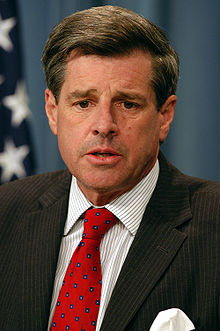Paul Bremer
Lewis Paul Bremer III (born September 30, 1941 in Hartford , Connecticut ) is an American diplomat and government official. He was appointed civil administrator for Iraq on May 6, 2003 by President George W. Bush , replacing the previous administrator Jay Garner after just a few weeks.
Life
Bremer graduated from the Phillips Academy in Andover ( Massachusetts ). He then studied economics and political science at the universities of Yale and Harvard and at the Institut d'études politiques de Paris .
The Republican Bremer worked for the US State Department from 1966 to 1989 . During this time he held the post of ambassador to the Netherlands (1983 to 1986). From 1986 he headed the Counter-Terrorism Division as Assistant Secretary of State . In 1989 Bremer moved to the private sector as an expert in risk assessment. In 1989 he became a senior manager at Kissinger and Associates , a consulting firm founded by Henry Kissinger . In June 2000, as chairman of the National Terrorism Commission, he warned of a major terrorist attack in the United States. In 2002, President Bush hired him to serve on his homeland security advisory body. On May 6, 2003, he became head of the coalition interim administration for Iraq and held the position until the transfer of sovereignty to an Iraqi interim government on June 28, 2004.
A short time later, he finished his career in the civil service and now works as a ski instructor in the US state of Vermont .
Political reforms in Iraq
On September 19, 2003, Paul Bremer, in his role as administrator, issued a series of ordinances that fundamentally changed Iraqi economic policy: he privatized practically all state-owned companies within a very short time, sometimes at very low prices, and allowed foreign companies to have full ownership rights in Iraqi companies and total repatriation of profits; Iraqi banks were also opened to foreign capital, and tariffs were completely abolished. However, the oil industry was initially exempt from these requirements.
Other important decisions by Bremer were the ban on the Ba'ath party with 50,000 members and the dissolution of the Iraqi army with 450,000 members. Privatization, party bans and the dissolution of the army resulted in social declassification for millions of Iraqis and are considered to be the reason for the lack of balance between political groups and religious communities in Iraq. Between the occupation of Iraq by American troops and today, approximately 120,000 civilians have died.
A uniform tax system with a degressive tax rate was also introduced. Strikes have been banned and the right to organize restricted.
Honors
2004 gave US President George W. Bush Bremer, the Medal of Freedom ( "The Presidential Medal of Freedom"), the highest civilian honor in the United States.
See also
Web links
- Paul Bremer in the nndb (English)
- Wolfgang Greber: "US administrator Bremer ignored advice" . Sir Brian Burridge led the 46,000-strong British contingent to Iraq in 2003 and conquered the south of the country around Basra. A conversation about opportunities and mistakes. In: The world . March 20, 2013.
- US passes law to control seeds and crops in Iraq - patents instead of bombs
swell
- ↑ http://history.state.gov/departmenthistory/people/bremer-l-paul
- ^ Terrorists' Friends Must Pay a Price (L. Paul Bremer III) . Freeman.org. August 5, 1996. Archived from the original on December 7, 2010. Retrieved on May 2, 2010.
- ↑ CBS News March 26, 2018: Paul Bremer, who helped run Iraq occupation, is now a ski instructor , accessed April 1, 2018.
- ↑ a b TV station ARTE , March 19, 2013, 8:15 p.m .: IRAQ 2003 - THE REVERSE SIDE OF WAR (1/2) ( Memento from March 21, 2013 in the Internet Archive ) Online: Part 1 , Part 2
- ↑ cf. Naomi Klein: The shock strategy, p. 451ff, David Harvey: Der neue Imperialismus, p. 207ff.
| personal data | |
|---|---|
| SURNAME | Bremer, Paul |
| ALTERNATIVE NAMES | Bremer, Lewis Paul III (full name) |
| BRIEF DESCRIPTION | American politician, civil administrator for Iraq |
| DATE OF BIRTH | September 30, 1941 |
| PLACE OF BIRTH | Hartford , Connecticut |

